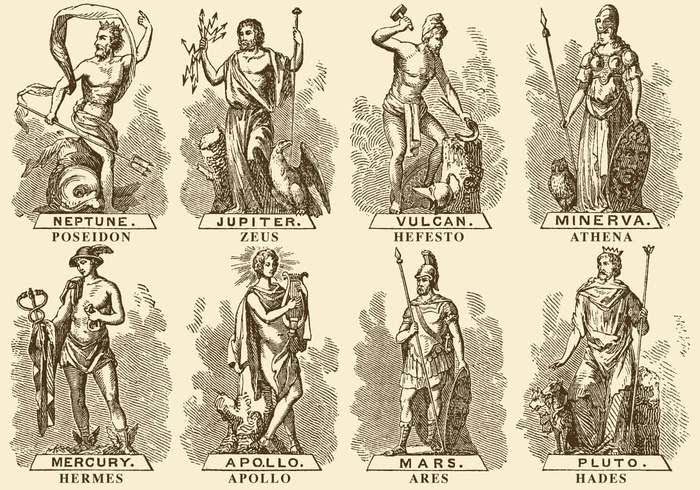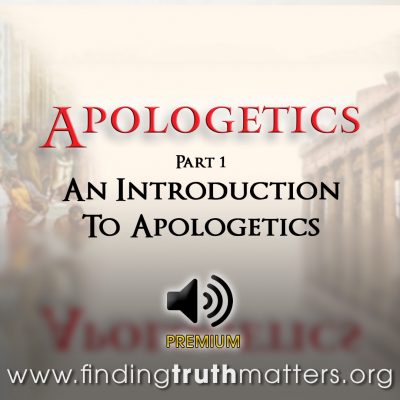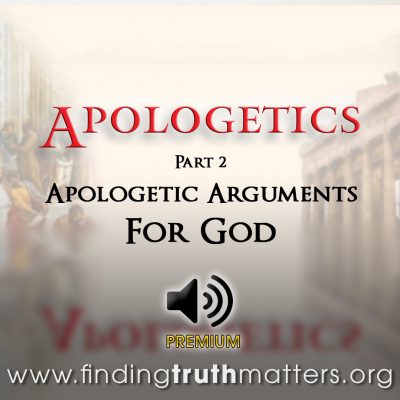home > articles > Is Atheism Just Believing In One Less God Than Christianity?
Some atheists claim that the only difference between them and Christians, is that they believe in one less god than Christians. They, like Christians, don’t believe in the ‘gods’ of Ancient Rome. Christians therefore, on this premise, are ‘atheists’ (for not believing in the existence of the Roman gods). Interestingly, this was the same accusation that the ancient Romans actually levelled at the early Christians as well – for the same reason as modern atheists. After all, these Romans pointed out, Christians didn’t believe in all the gods which the Romans venerated – Mars, Hermes, Zeus, Jupiter, and so on.

Greek gods pantheon
But the reason that Christians reject the gods of mythology, yet accept the God of the Bible, is the same reason: the evidence. There is no evidence for the mythological gods of the Greeks and Romans, and there is sufficiently verifiable evidence for the God of the Bible!

Minerva (Athena) etching
THE FLAW IN THE ATHEIST’S ASSERTION
To illustrate the flaw in the logic of the atheist’s assertion that they are being ‘rational’ by rejecting “one more god” than Christians, imagine a murder investigation where suspect after suspect is proven to be not-guilty. Eventually a suspect is charged after investigators follow the evidence and are convinced he is guilty. What would the judge say if his defence attorney argued, “Your honour, authorities have dismissed 27 other suspects, we are just asking you to dismiss one more!” Of course, this line of defence is extremely unlikely. The guilt or innocence of this defendant is irrelevant to how many other suspects have been ruled out. Rather, his guilt or innocence is based on the cumulative evidence for or against him. In the same way, the existence or otherwise of the God of the Bible is based on evidence – not how many other ‘suspects’ (such as Minerva, Mars, Zeus, Hermes, and so) can have their existence ruled out.

MARS, 1540.
Roman god of war and personification of the planet Mars. Pen drawing, 1540, by Erhard Schon.
THE NATURE OF EVIDENCE
Some atheists respond by asserting that there is no evidence for the God of the Bible. This reasoning is partly (if not entirely) grounded in the assertion that the only acceptable evidence is ‘hard science’. Hard science is that which can be verified mathematically, or by repeatable physical experiments such as in chemistry or physics.
I’m not sure if it has dawned on those who propose this test for truth that this test itself cannot be verified mathematically or scientifically!

What kind of evidence would be sufficient for having good reasons for believing in the veracity (truthfulness) of the God of the Bible?
Unlike the assertion by some who deny the existence of the God of the Bible that the only sufficient proof for the truthfulness of any claim is that it can be proved mathematically or scientifically (which therefore renders that assertion itself as false), in actuality, we generally accept that proof or evidence must sufficiently correspond to the claim being made. Historic claims rely on credible witness testimony. Medical claims often rely on subjective testimony. Legal claims often depend on circumstantial evidences.

THE EVIDENCE FOR THE GOD OF THE BIBLE
The Bible makes certain very clear and specific claims about God. These claims can be tested in corresponding ways. For example, it begins by claiming that God is creator of all matter, time, space, and energy. It is now scientifically demonstrable that the universe had a beginning. This is referred to as ‘Big Bang Cosmology’. The Big Bang marked the beginning of all matter, time, space and energy. There are only two choices when it comes to explaining how this happened: i) Something/Someone caused it; or, ii) Nothing caused it. Since nothing cannot cause anything, it is logical that it is was option i), Something or Someone.
Perhaps the most compelling evidence for the truthfulness of the God of the Bible is the person, life, and work of Jesus of Nazareth. What He did was extraordinary. The early Christians wrote of Him-
How God anointed Jesus of Nazareth with the Holy Spirit and with power. He went about doing good and healing all who were oppressed by the devil, for God was with Him.
Acts 10:38
The most extraordinary thing He did was to rise from the dead three days after He was crucified and buried in a tomb! A former hostile persecutor and enemy of early Christianity, who was dramatically converted to be a follower of the Christ, Saul of Tarsus, wrote around A.D. 55 (25 years after the crucifixion and burial of Jesus) that Christ had been seen alive, (then crucified), then raised from the dead by more than 500 eye-witnesses. He states to his Corinthians audience that most of these eye-witnesses were still alive at the time of writing.
¶ For I delivered to you as of first importance what I also received: that Christ died for our sins in accordance with the Scriptures, that He was buried, that He was raised on the third day in accordance with the Scriptures, and that He appeared to Cephas, then to the twelve. Then He appeared to more than five hundred brothers at one time, most of whom are still alive, though some have fallen asleep.
First Corinthians 15:3-6
 This testable claim by Saul of Tarsus (who was also called Paul the apostle) was not disputed by opponents of Christianity and became a compelling argument for many first-century Jews and Gentiles to accept the truthfulness of Christianity’s claims. Since then, down through the ages many sceptics, critics, and those hostile to Christianity have attempted to disprove this central claim of Christianity and many have ended up being converted to Christ as a result of their quest. In recent times this has included the conversion of sceptics: Albert Henry Ross (writing under the name Frank Morison), C.S. Lewis, and Josh McDowell, each whom contested the historicity of the resurrection of Jesus and then ended up conceding it.
This testable claim by Saul of Tarsus (who was also called Paul the apostle) was not disputed by opponents of Christianity and became a compelling argument for many first-century Jews and Gentiles to accept the truthfulness of Christianity’s claims. Since then, down through the ages many sceptics, critics, and those hostile to Christianity have attempted to disprove this central claim of Christianity and many have ended up being converted to Christ as a result of their quest. In recent times this has included the conversion of sceptics: Albert Henry Ross (writing under the name Frank Morison), C.S. Lewis, and Josh McDowell, each whom contested the historicity of the resurrection of Jesus and then ended up conceding it.
 “You must picture me alone in that room in Magdalen, night after night, feeling, whenever my mind lifted even for a second from my work, the steady, unrelenting approach of Him whom I so earnestly desired not to meet. That which I greatly feared had at last come upon me. In the Trinity Term of 1929 I gave in, and admitted that God was God, and knelt and prayed: perhaps, that night, the most dejected and reluctant convert in all England. I did not then see what is now the most shining and obvious thing; the Divine humility which will accept a convert even on such terms. The Prodigal Son at least walked home on his own feet. But who can duly adore that Love which will open the high gates to a prodigal who is brought in kicking, struggling, resentful, and darting his eyes in every direction for a chance of escape? The words “compelle intrare,” compel them to come in, have been so abused be wicked men that we shudder at them; but, properly understood, they plumb the depth of the Divine mercy. The hardness of God is kinder than the softness of men, and His compulsion is our liberation.”
“You must picture me alone in that room in Magdalen, night after night, feeling, whenever my mind lifted even for a second from my work, the steady, unrelenting approach of Him whom I so earnestly desired not to meet. That which I greatly feared had at last come upon me. In the Trinity Term of 1929 I gave in, and admitted that God was God, and knelt and prayed: perhaps, that night, the most dejected and reluctant convert in all England. I did not then see what is now the most shining and obvious thing; the Divine humility which will accept a convert even on such terms. The Prodigal Son at least walked home on his own feet. But who can duly adore that Love which will open the high gates to a prodigal who is brought in kicking, struggling, resentful, and darting his eyes in every direction for a chance of escape? The words “compelle intrare,” compel them to come in, have been so abused be wicked men that we shudder at them; but, properly understood, they plumb the depth of the Divine mercy. The hardness of God is kinder than the softness of men, and His compulsion is our liberation.”
C.S. Lewis, Surprised by Joy: The Shape of My Early Life
The claim by some atheists that the only difference between them and Christians is that they reject one more god than Christians is unreasonable. The reality is that both atheists and Christians reject unfounded claims about the mythological gods of the ancient Greeks and Romans. But Christians accept the claims about the God of the Bible because of the substantial, sufficient, and compelling evidence for it. While this evidence may not convince every hardened sceptic, it is unfair for any atheist to claim that there is none.
Dr. Andrew Corbett
6th December 2018
-
Sale!

5 Things We Need To Do To Break Our Church’s 200 Barrier, Premium Audio
Original price was: $1.75.$0.95Current price is: $0.95. -
Sale!

A Morning With Izaak Walton – The Compleat Man, Premium Audio
Original price was: $1.75.$1.25Current price is: $1.25. -
Sale!

Apologetics Part 1 – Introduction To Apologetics, Premium Audio
Original price was: $1.75.$0.95Current price is: $0.95. -
Sale!

Apologetics Part 2 – The Apologetic Arguments For God, Premium Audio
Original price was: $1.75.$0.95Current price is: $0.95.






































0 Comments